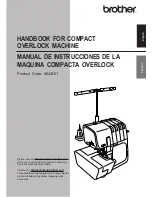
138
EMBROIDERY
Successful Embroidering
This section describes the preparations and basic procedures for embroidering.
What to prepare
The following is necessary for embroidering.
■
Fabric
Prepare the fabric for embroidery. Prepare a piece
of fabric a little larger than the embroidery frame
that matches the size of the pattern you want to
sew.
Note
z
Always use stabilizer when sewing
embroidery projects, especially when
embroidering on lightweight or stretch
fabrics. Not using a stabilizer may result in
poor quality embroidery designs.
z
When embroidering on large pieces of
fabric, arrange the fabric so that it does not
hang off the table where the sewing machine
is placed. If embroidery is done with the
fabric hanging off, the embroidery unit
movement may be impaired, this could
cause the pattern to sew incorrectly.
CAUTION
■
Stabilizer material
Stabilizer material is used for backing and topping
to stabilize and support the fabric being
embroidered so the stitches can be sewn with the
least amount of interference or instability.
Without the proper type of backing stabilizer, the
fabric may move too much within the embroidery
frame causing poor alignment of the embroidery.
At times, topping will be required in order to
manage fabrics with a pile-like surface, such as
towels, corduroy and pique knit. There are many
types of backing and topping stabilizers with
various weights for the various fabrics that you
may be sewing. Visit your local retailer to find the
stabilizer that is right for your project.
■
Embroidery thread
For the upper thread, use a good quality
embroidery thread. Choice of the upper thread is
a major factor in a successful embroidery design.
The thread strength, consistency and weight all
affect the design results. These qualities
determine how well the machine will sew and the
number of thread breaks during sewing.
For the bobbin thread, use the recommended
embroidery bobbin thread found on the
accessories page or visit your local retailer for
additional thread.
Note
z
For good quality embroidery designs be sure
to use embroidery thread designed for
embroidery machines.
z
Before starting to sew, be sure there is
enough bobbin thread. If you continue
embroidering when the bobbin thread is
low, the thread may become tangled.
●
Do not embroider fabrics that are too
thick. To check the fabric thickness,
attach the embroidery frame to the
embroidery unit, and use
(“Needle
Position” button) to raise the needle. If
there is space between the presser foot
and the fabric, the fabric can be
embroidered. If there is not space, do not
embroider the fabric. Otherwise, the
needle may break, resulting in injury.
●
Be careful when sewing overlapping
patterns. The needle may not easily pierce
the fabric, causing the needle to break.
Summary of Contents for Ellure PLUS BLR3
Page 1: ......
Page 5: ...3...
Page 16: ...14...
Page 48: ...GETTING READY 46...
Page 180: ...178 EMBROIDERY...
Page 198: ......
Page 199: ......
















































